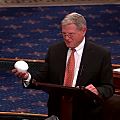Agnotology facts for kids
Agnotology is a branch of science which looks at the ways in which doubt or ignorance about certain subjects is created. A very good example of how this happens is the publication of scientific studies that rely on data that is inaccurate or misleading. More generally, the term also highlights the increasingly common condition where more knowledge of a subject leaves one more uncertain than before.
The neologism was coined by Robert N. Proctor, a Stanford University professor specializing in the history of science and technology. Proctor cites the tobacco industry's conspiracy to manufacture doubt about the cancer risks of tobacco use as a very good example of how this can be done. Under the banner of science, the industry produced research about everything except tobacco hazards to exploit public uncertainty.
The way in which media attention works can be exploited to produce ignorance. Other factors that influence it are that corporations or governments do not reveal certain facts. At times, they force these facts to be removed if they have been revealed. The methods they use include censorship, destroying documents, putting the weight of certain facts differently, or being inattentive or forgetful.
Agnotology also focuses on how and why diverse forms of knowledge do not "come to be," or are ignored or delayed. For example, knowledge about plate tectonics was censored and delayed for at least a decade because key evidence was classified military information related to underseas warfare.
Images for kids
-
U.S. Senator James Inhofe (R-OK) holding a snowball on the Senate floor during a speech in which he derided climate change as a hoax.
See also
 In Spanish: Agnotología para niños
In Spanish: Agnotología para niños


